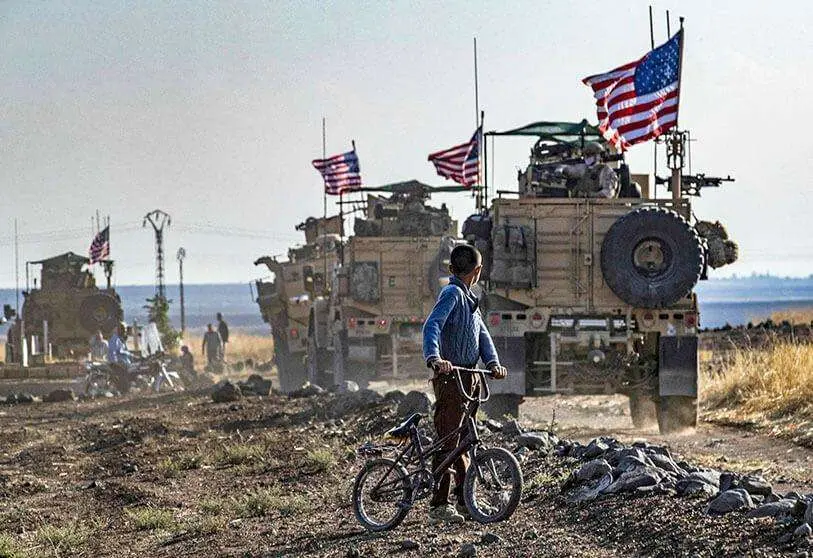The United States strengthens its presence in Syria after a confrontation with Russia

The US Army has sent new armoured vehicles, radar systems and more troops to Syria to reinforce its military presence in this Middle Eastern country following a confrontation with Russia. This deployment is also accompanied by an increase in air patrols over the east of the nation, the United States' central command, CETCOM, announced for the area this Friday in a press release available on its website. US military officials say they need to ensure the security of coalition forces on the ground.
"The United States has deployed Sentinel radar, increased the frequency of US fighter plane patrols over the US military on the ground and deployed Bradley fighter vehicles to augment US forces in the Security Area of eastern Syria," said CENTCOM spokesman Captain Bill Urban in the statement.
"These actions are a clear demonstration of the United States' determination to defend the coalition forces in eastern Syria and ensure that they can continue their mission to defeat the Daesh's remnants without interference," Urban said in the press release. The new deployment will include half a dozen Bradleys and around 100 soldiers, although it has not been revealed where exactly in Syria they will be deployed. Although the communiqué does not explicitly mention Russia, a US official, who has preferred to remain anonymous, has pointed out to CNN that the deployments are designed to send a signal to Russia that it should not act on its own and avoid unprofessional and unsafe actions in Syria.

This new movement by the United States comes less than a month after a tense encounter between American and Russian forces in Syria. This was followed by a collision of military vehicles from both countries which, according to the Pentagon, left at least four US soldiers injured. Washington accused Moscow of provocative behaviour during the incident. Russia assured that the US military were aware of the route the Russian patrol was taking and that the US vehicles attempted to block the road.
The US president, Donald Trump, has insisted that the US forces are no longer in Syria, except for those in charge of protecting the oil, in reference to the US soldiers operating with the local Kurdish militants who occupy several oil fields in eastern Syria.
Syria's war, which pits Bashar al-Asad's government, which is strongly supported by Vladimir Putin's Russia, against the insurgents entrenched in Idlib's last rebel stronghold, has been going on for nearly a decade and has become one of the frozen conflicts of the Middle East. Over the past year Turkey has become increasingly involved in the conflict and even demanded the withdrawal of Russian troops following a summit between Ankara and Moscow in February, which failed to produce results. The Al-Asad administration has been arguing that its aim in the war in the Arab country is to put an end to the Jihadist terrorism encompassed in Idlib's resistance in order to reunify and pacify the whole country; all this in the face of an insurgent counter-police and a new opposition represented by the interests defended by Turkey, a nation that is supported by paid mercenaries from former branches of terrorist groups like al-Qaeda.
The Islamic Republic of Iran is one of the allies of Syrian President Bashar al-Asad and continues to be present on Syrian territory. Syrian sources revealed that there has been no withdrawal or partial reduction of Iran's military presence in Syria. These informants assured the London-based pan-Arab newspaper Al-Quds al-Arabi that the system of Persian labour on Syrian soil has not been modified; they added that the Iranian officers had not abandoned any Syrian military centre unless their work had been completed from the logistic and technical point of view. According to the sources, the official Syrian regime did not ask the Iranians to reduce their influence in Syria, just as they are not currently planning to reduce their military presence, particularly that of their advisers.
The informants added that military cooperation between Damascus and Teheran did not change following the assassination of Qassem Soleimani, commander of the Quds Forces (international division of Iran's Islamic Revolutionary Guard that influences the internal affairs of countries such as Syria, Iraq and Lebanon); killed in a drone operation conducted by the United States on 3 January near the airport of the Iraqi capital Baghdad, which also killed Abu Mahdi al-Muhandis, vice-president of the Shiite People's Mobilisation Forces associated with the Persian country. "The Iranian army is still in position. It is possible that there has been a change in their positions for logistical and other reasons related to the repeated Israeli attacks on some military sites, but their work and technical presence remain the same", they stated.








